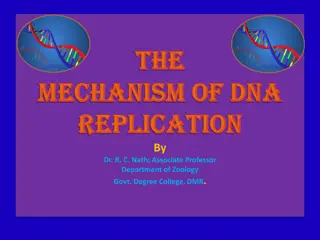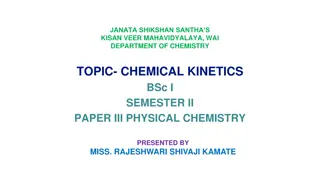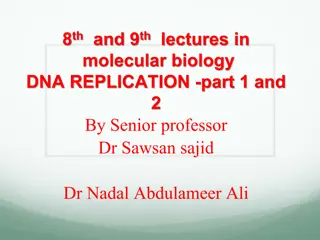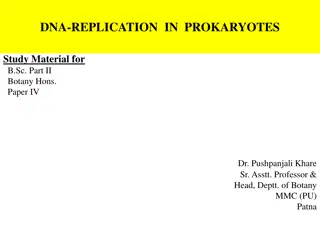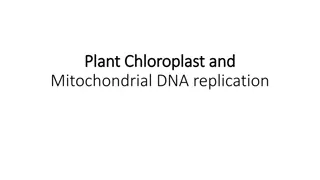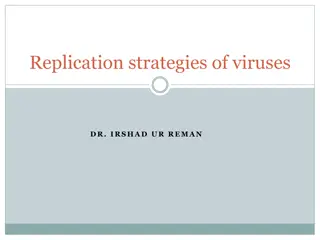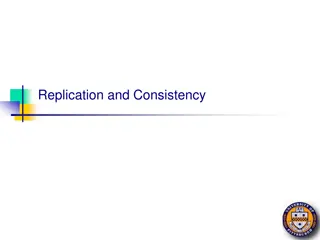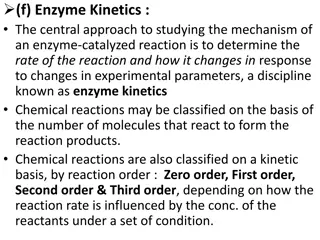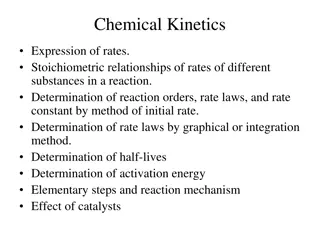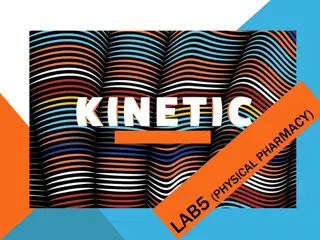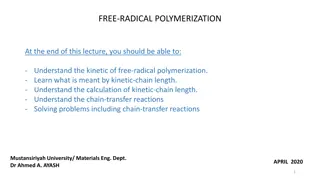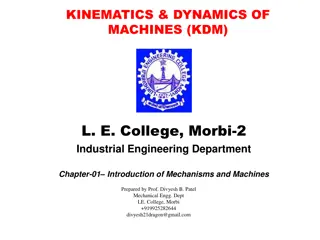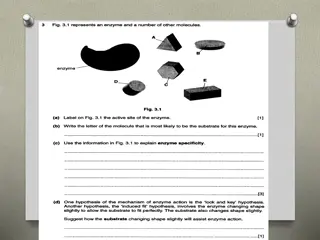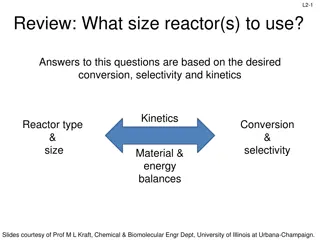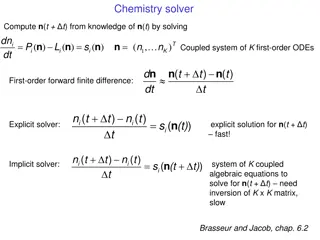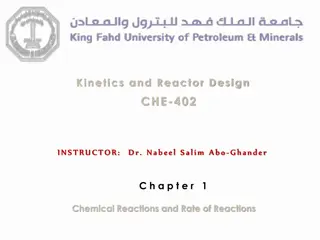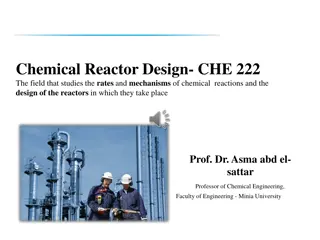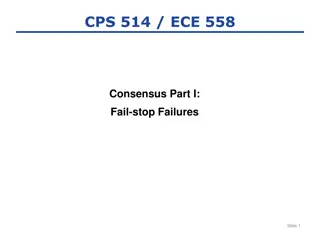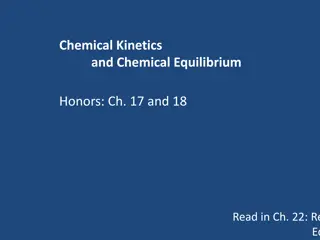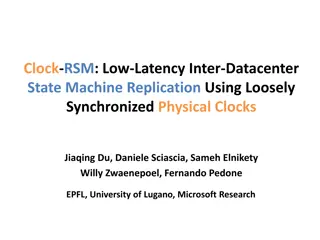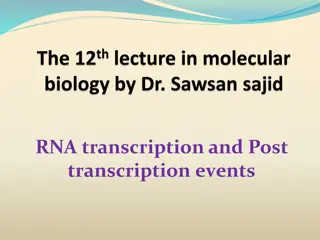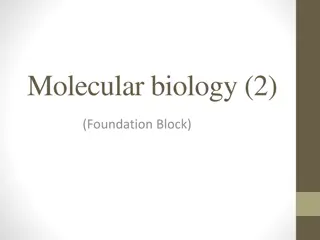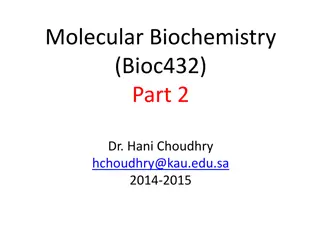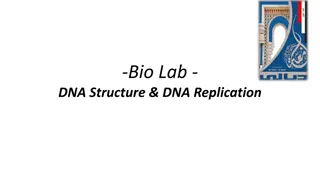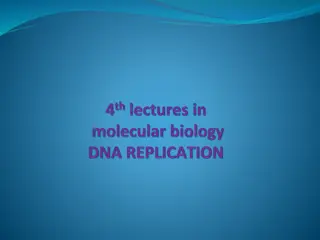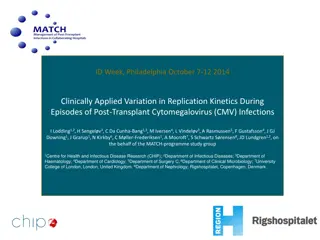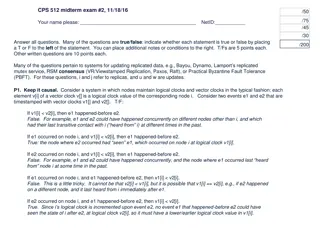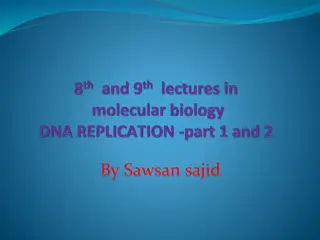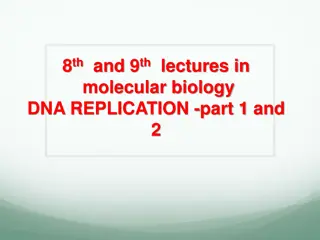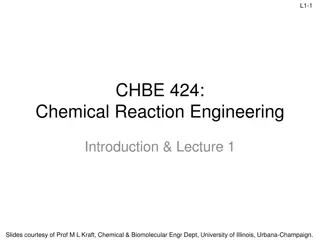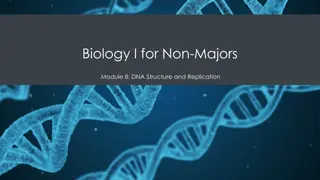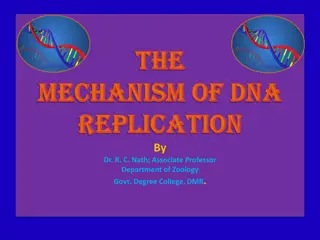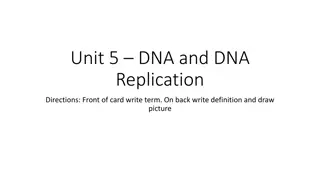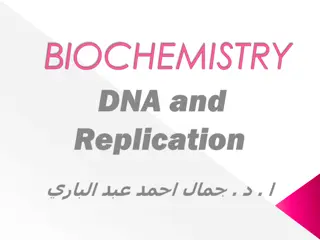Data Director Replication Best Practices
Explore best practices in data replication using methods like SQL, Web Services, and SaaS architecture. Learn about distribution, security, and central versions. Gain insights into replication processes and strategies.
1 views • 62 slides
Understanding the Mechanism of DNA Replication
Explore the intricate process of DNA replication, as elucidated by renowned scientists like Dr. R. C. Nath and Nobel laureate Arthur Kornberg. Delve into the essential enzymes, proteins, and basic rules involved in the replication of genetic material, shedding light on initiation, elongation, and te
3 views • 22 slides
Aspen Simulation of Steam Reforming and Haber-Bosch Processes in Kinetics Reactors
Aspen simulation showcases the kinetics reactors for steam reforming of natural gas and the Haber-Bosch process for ammonia production. Steam reforming is highly endothermic, producing hydrogen and CO, while the Haber-Bosch process is exothermic, crucial for ammonia synthesis. The RPlug reactor and
4 views • 26 slides
Chemical Kinetics: Understanding Reaction Rates and Factors
Chemical kinetics is a branch of physical chemistry that explores the velocity and factors influencing chemical reactions. It studies how reactants transform into products, considering conditions like temperature, pressure, and reactant concentrations. Factors affecting reaction rates include the na
7 views • 24 slides
Understanding DNA Replication Process: Insights and Mechanisms
DNA replication is a crucial biological process where identical copies of DNA molecules are produced for cell division. Initiated by specific proteins, it involves stages like initiation, elongation, and termination. Enzymes like helicases and DNA polymerase play key roles in forming replication for
0 views • 33 slides
Understanding DNA Replication in Prokaryotes for B.Sc. Botany Hons. Students
Study material on DNA replication in prokaryotes focusing on key concepts like semiconservative mode of replication, involvement of enzymes, different models for understanding replication, and the bidirectional nature of DNA replication in prokaryotes. The material covers the process steps including
0 views • 33 slides
Plant Mitochondrial and Chloroplast DNA Replication Mechanisms
Plant mitochondria and chloroplasts have intricate DNA replication processes. Mitochondrial DNA replication is independent of the plant cell cycle and is associated with specific proteins in nucleoid complexes. Plant mtDNA contains more genes than animal mtDNA, with a complex structure involving int
1 views • 16 slides
Viral Genome Replication Strategies and Mechanisms
Viruses utilize different replication strategies to ensure the replication of viral genomes, packaging into virions, and potentially altering the host cell's structure or function. These strategies are vital for the virus to operate effectively within the host cell's constraints. The replication pro
0 views • 15 slides
Understanding Replication and Consistency in Computer Systems
Explore the concepts of replication and consistency in computer systems, discussing the benefits and challenges of using replicas for reliability, performance, and scalability. Learn about object replication problems and solutions, and the importance of maintaining consistency in shared data access.
1 views • 26 slides
Exploring Enzyme Kinetics for Understanding Chemical Reactions
Enzyme kinetics is a vital discipline focusing on the rate of enzyme-catalyzed reactions and how they respond to varying conditions. Reactions are classified based on reactant concentration influences. Zero, first, second, and third order reactions are distinguished, with examples like first-order r
0 views • 31 slides
Understanding Chemical Kinetics: Rates, Reactions, and Mechanisms
Chemical kinetics involves studying reaction rates, rate laws, stoichiometry, and factors affecting reaction speed. This branch of chemistry delves into determining reaction orders, rate constants, and activation energies using various methods. Different types of rates, such as initial, instantaneou
2 views • 68 slides
Addressing Replication Crises and Hidden Controversies in Phil.Stat
High-profile failures of replication have sparked debates on reforming statistical methods in science. Hidden controversies include Statistics Wars, Replication Paradoxes, and underlying assumptions. Significance tests and p-values play crucial roles, but proper interpretation is essential to avoid
0 views • 48 slides
Understanding the Kinetics of Fast Reactions in Chemistry
Kinetic methods involve measuring analytical signals under dynamic conditions to study fast reactions in chemistry. This study explores the various methods used, such as Flow Method and Stopped Flow Method, to determine reaction rates accurately. Advantages of the Stopped Flow Method over Continuous
0 views • 18 slides
Understanding Kinetics and Reaction Rates in Chemistry
Kinetics is the study of reaction rates and factors affecting them, such as concentration, temperature, catalysts, and more. Orders of reaction classify reactions based on rate dependency on reactant concentration. Factors like pH, light, and solvents can also impact reaction rates. Half-life and sh
0 views • 18 slides
Understanding Free Radical Polymerization Kinetics
This lecture covers the kinetics of free radical polymerization, including initiation, propagation, termination, and kinetic chain length concepts. It explains the calculation of kinetic chain length and chain-transfer reactions. Key points include the rate equations for initiation, propagation, and
0 views • 11 slides
Introduction to Kinematics and Dynamics of Machines in Mechanical Engineering
Theory of Mechanics delves into motion, time, and forces, with Kinematics focusing on motion analysis without considering external forces. Kinetics, a branch of Theory of Machines, deals with inertia forces resulting from mass and motion. Dynamics combines Kinematics and Kinetics to study motion and
0 views • 14 slides
Factors Affecting Enzyme Activity and Kinetics Experiments
Explore the factors influencing enzyme activity, such as substrate and enzyme concentration, temperature, pH, and inhibitors. Learn how to simulate enzyme kinetics using equipment like popping beads and stopwatches. Analyze results to understand the impact of substrate concentration on reaction rate
0 views • 22 slides
Understanding Chemical Kinetics: Reaction Rates and Mechanisms
Chemical kinetics is a branch of chemistry focused on studying reaction rates and mechanisms. Unlike thermodynamics, which deals with feasibility, kinetics explores the speed at which reactions occur. Factors such as temperature, pressure, and catalysts influence reaction rates. Understanding the ra
3 views • 72 slides
Reactor Sizing: Conversion, Selectivity, and Kinetics Overview
Understanding reactor design involves considerations such as desired conversion, selectivity, and kinetics. Key concepts include rate laws, molar balances, and reactor types. Through molar balance equations and reactor design processes, one can derive essential equations for ideal batch, CSTR, and P
2 views • 20 slides
Chemical Kinetics and Numerical Solvers in Chemistry
Explore the principles of chemical kinetics and the use of numerical solvers to compute concentrations over time, considering explicit and implicit methods. Understand stability and positivity requirements in solvers and the importance of characteristic time scales in chemical systems. Dive into a s
0 views • 5 slides
Fundamentals of Chemical Kinetics and Reactor Design
Explore the realm of chemical reactions, rate equations, and reactor design in this informative chapter. Understand the factors influencing reaction rates, different types of reactions, rate laws, and experimental determination of reaction rates. Dive into examples illustrating stoichiometry and rat
0 views • 19 slides
Overview of Chemical Reactor Design and Operation
Chemical reactor design involves studying the rates and mechanisms of chemical reactions, as well as the design of reactors for these reactions on a commercial scale. This field combines principles from thermodynamics, chemical kinetics, fluid mechanics, mass transfer, heat transfer, and economics t
0 views • 12 slides
Raft Consensus Algorithm Overview
Raft is a consensus algorithm designed for fault-tolerant replication of logs in distributed systems. It ensures that multiple servers maintain identical states for fault tolerance in various services like file systems, databases, and key-value stores. Raft employs a leader-based approach where one
0 views • 34 slides
Understanding the Interface to the Current CCPP: A Simple Model's Perspective
This content explores the interface to the current CCPP from a simple model's viewpoint, focusing on two simplistic schemes - kinetics and chem_solve. It delves into how the MusicBox simple driver model adapts chemical species using temperature and rate constants. Users can control the run sequence
0 views • 9 slides
Understanding Chemical Kinetics and Equilibrium in Reactions
Explore the basic concepts of reaction rates, collision theory, activation energy, and energy diagrams in chemical kinetics and equilibrium. Learn how particles must collide with the correct orientation and enough energy to form an unstable activated complex. Discover the role of activation energy i
0 views • 24 slides
Low-Latency Inter-Datacenter State Machine Replication Using Clock-RSM
Clock-RSM introduces a low-latency approach to inter-datacenter state machine replication by utilizing loosely synchronized physical clocks. This method ensures strong consistency, fault tolerance, and fast failover in a geo-replication environment. By overlapping ordering and replication using phys
0 views • 29 slides
Differences Between DNA Replication and RNA Transcription
This content discusses the general variances between DNA replication and RNA transcription, highlighting their purposes, processes, enzymes involved, timing, and more. It delves into the initiation, template, and involved areas of replication and transcription, as well as key DNA regions like promot
0 views • 24 slides
Understanding DNA Replication and Genetic Transcription
Explore the fundamental concepts of molecular biology focusing on DNA replication, transcription of genetic material into mRNA, and translation into functional proteins. Learn about the semiconservative nature of Eukaryotic DNA replication, the proteins involved, steps in the replication process, an
0 views • 25 slides
Understanding DNA Replication: Models and Process Overview
DNA replication is a fundamental process where the DNA molecule unwinds and two new daughter strands are synthesized based on base-pairing rules. Three models - conservative, semiconservative, and dispersive - explain how DNA replication occurs, with each model having specific characteristics. Enzym
0 views • 22 slides
Understanding DNA Structure and Replication
Discover the key aspects of DNA, including its structure as a nucleic acid polymer composed of nucleotides and the process of DNA replication. Learn about the double helix structure, base pairing rules, and the semi-conservative replication mechanism. Explore how DNA is synthesized in a 5 to 3 direc
0 views • 18 slides
Understanding DNA Replication Process in Living Organisms
DNA replication is a fundamental biological process where an original DNA molecule produces two identical copies. This process involves initiation, elongation, and termination stages, utilizing replicator and initiator proteins. The DNA is unwound and replicated with the help of enzymes like helicas
0 views • 16 slides
Replication Kinetics in Post-Transplant CMV Infections
This study explores the variation in replication kinetics of Cytomegalovirus (CMV) during post-transplant infections. The aim is to assess the doubling time of CMV and evaluate the rationale behind weekly screening intervals in transplant recipients. Methods include analyzing CMV PCR samples and rev
0 views • 21 slides
Causal Relationships in Replication Systems
In this piece, we explore various aspects of causal relationships within replication systems such as the significance of logical and vector clocks, updates propagation in systems like Bayou, and commitment to learning order in asynchronous replication systems. Through analyzing scenarios and stateme
0 views • 8 slides
Understanding DNA Replication: From Basics to Lab Synthesis
DNA replication is a fundamental process in all living organisms, essential for biological inheritance. This comprehensive guide explores the stages of DNA replication, highlighting key experiments and differences between prokaryotic and eukaryotic replication. Additionally, it delves into the revol
1 views • 31 slides
Understanding DNA Replication: Process and Significance
DNA replication is a fundamental process in all living organisms, crucial for genetic inheritance. This article covers the stages of DNA replication, including initiation, elongation, and termination. It discusses important concepts such as semi-conservative replication, proofreading mechanisms, and
0 views • 29 slides
Introduction to Chemical Reaction Engineering
Chemical Reaction Engineering (CRE) is crucial for understanding how chemical reactors operate in various processing operations. This field involves reactor design by integrating factors such as thermodynamics, kinetics, fluid mechanics, heat transfer, and economics. CRE aims to effectively design a
0 views • 16 slides
Understanding DNA Structure, Replication, and Proofreading
Exploring the intricate world of DNA, this module delves into the structure of DNA, highlighting nucleotides, nitrogenous bases, and the double helix. It emphasizes how DNA stores genetic information in genes and undergoes replication through a semi-conservative model. The process of DNA replication
0 views • 13 slides
Understanding DNA Replication: Concepts and Mechanisms Explored
Delve into the intricate process of DNA replication, as elucidated by Dr. R. C. Nath and other renowned scientists. Explore the fundamental principles such as semi-conservative replication, origin of replication, and the roles of essential enzymes like DNA polymerase. Uncover the core proteins invol
0 views • 22 slides
Understanding DNA and DNA Replication: Key Concepts with Visual Aids
Explore essential terms related to DNA and DNA replication, including chromosomes, genes, nucleotides, double helix structure, hydrogen bonds, and more. Discover the process of DNA replication, involving enzymes like DNA polymerase and helicase, and the concept of semi-conservative replication. Rein
0 views • 13 slides
Insights into DNA Replication and Chromosome Structure
DNA replication is a fundamental process vital for the transmission of genetic information. Chromosomes, composed of DNA-protein complexes, store genetic information, and replication involves the synthesis of new DNA molecules. Enzymes play crucial roles in DNA synthesis, and in E. coli cells, repli
0 views • 16 slides

